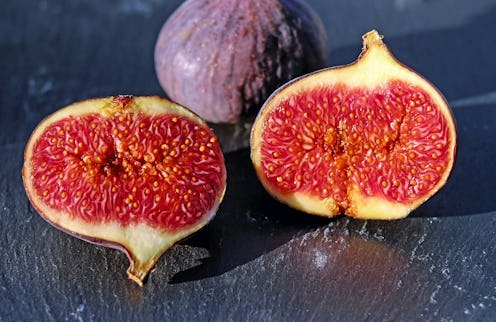Life
The Best Plant-Based Sources Of Calcium

We've been fed the same calcium myth since we were little kids waiting in the lunch line at our school cafeteria: Milk is the best way to get your daily fill of calcium, the mineral that strengthens bones and teeth, regulates our heartbeat, and helps to transmit nerve impulses. All the "Got Milk?" campaigns (sponsored by the dairy industry) convinced us that dairy equals calcium, and calcium equals strong bones — and how were we supposed to grow up without strong bones? For the most part, though, we've actually been misinformed about how much calcium we actually need, and what the best sources of calcium actually are.
Julieanna Hever, a plant-based dietitian, author, and health and fitness expert is here to set the record straight. "The predominant myth is that we need dairy to achieve our calcium recommendations," Hever tells Bustle. "We can find calcium in a plethora of possible sources." More importantly, though, Hever says it's not about how much calcium we actually consume — rather it's about how much calcium is absorbed into our bodies.
It's currently recommended that adults consume 1,000 to 1,200 milligrams of calcium a day, but many plant-based nutritionists insist the recommendation is only this high because our society largely relies on animal protein for calcium, which results in a high calcium excretion rate. In other words, you could actually be losing a lot of the calcium you consume from animal products. A study by the American Journal of Clinical Nutrition backs this up: when you're eating the right plant-based foods that allow your body to actually absorb calcium more effectively, you only need between 500 and 741 mg of calcium a day.
Dairy has many more health drawbacks and detrimental environmental impacts than plant-based foods. So, with that in mind, here are the six best plant-based sources of calcium.
Leafy Green Vegetables
Spinach, kale, broccoli, collard greens, and cabbage are some of the frontrunners in the leafy green category. All of these veggies will give you all the calcium you need for the day (and quite a lot of protein, too). For example, one serving of kale grants you 150 mg of calcium, while one serving of lowfat cow's milk gives you 125 mg. Remember, though, it's more than just the amount of calcium present — it's how your body absorbs it.
"Surprisingly, the calcium in kale is 30 percent more absorbable than calcium sourced from dairy products," Hever says. Similarly, less than a third of the dairy you eat is actually bioavailable, (which is just a fancy word for absorbable). So your body definitely has a lot to gain from munching on kale chips as opposed to sipping on a glass of milk.
Legumes
Things like lentils, navy beans, kidney beans, lima beans, and great northern beans are a tremendous source of bioavailable calcium. Hever says two cups of white beans will give you almost 100 mg of the calcium your body needs. Furthermore, there are plenty of other benefits that legumes have that dairy lacks completely.
"Dairy products contain health-damaging elements, such as saturated fat," Hever tells Bustle. "In fact, cheese is the leading source of saturated fat in the western diet." On the other hand, legumes have little-to-no saturated fat, and they're cholesterol free. They're also full of protein, magnesium, and folate, and eating them lieu of dairy products can help prevent heart disease.
Almonds & Almond Butter
If you're an avid peanut butter eater, you may want to consider making the switch to almond butter, because these nuts pack a mean calcium punch. In a measly 1/4 cup of almonds alone, you get 94 mg of calcium. They're notorious for keeping your bones strong, and they actually promote calcium absorption in general. You'll also get a healthy serving of vitamin E, copper, and magnesium.
Soy Products
One cup of cow's milk, which has 96 mg of absorbable calcium, is the equivalent of 5.4 oz of calcium-set tofu. Also, while one cup of cow's milk has only 96 mg of absorbable calcium, soy milk has up to 400 mg. (If you don't like soy milk, plenty of other plant-based milks come fortified with as much-or- more calcium than cow's milk, minus the health and environmental drawbacks.) Even half a cup of boiled soy beans gives you 100 mg of absorbable calcium. Additionally, products like tofu and tempeh are excellent sources of protein, magnesium, and iron.
Figs
These delicious fruits should really be your go-to source for calcium. Eating just eight dried figs gives you more than 100 mg of calcium (as if you'd only eat eight of them, anyway). Plus, they're full of potassium, magnesium, and fiber, making them the ultimate snack when you're feeling low on energy.
Hever says nutrient-dense foods like these are what we should be filling our bodies with. "It is ideal to opt for sources that also offer health-promoting compounds in addition to the calcium," she tells Bustle.
Sesame Seeds
You don't typically think about sesame seeds unless you see them sprinkled on top of a bagel or Asian takeout, but don't underestimate the power of these little seeds. Hever says sesame seeds "contain literally thousands of phytonutrients that act as powerful antioxidants." One tablespoon of sesame seeds contains 88 mg of calcium, so get yourself some tahini or a sesame shaker and go to town with it.